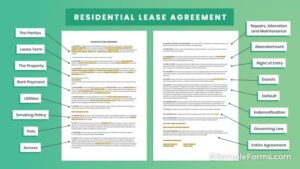
Are you sitting on a goldmine without even realizing it? Welcome to the wacky world of home equity loans, where your house can be your very own bank! Think of it as your house saying, “Hey, I’ve got your back!” while you tap into the treasure trove of your home’s value. This clever financial maneuver allows homeowners to borrow against their abodes, turning bricks and mortar into dollars.
So, buckle up as we explore the ins and outs of home equity loan approval, making sure you’re ready to ride this rollercoaster with a smile!
Understanding the basics of home equity loans is essential, as they differ from traditional loans. Eligibility criteria can feel like a secret handshake, but worry not, we’ll decode it all. Meanwhile, we’ll weigh the benefits, like funding a dream vacation or consolidating debt, against risks that can make your head spin faster than a revolving door. So, let’s dive into this financial adventure with both eyes wide open!
Home Equity Loan Basics

Home equity loans are like the secret stash of cash you didn’t know you could access without selling your home. Imagine being able to tap into the value of your abode while still living in it—yes, please! But before you start planning your tropical getaway, let’s break down what home equity loans are, how they work, and what to keep in mind.Home equity loans allow homeowners to borrow against the equity they’ve built up in their property.
Equity, in simple terms, is the market value of your home minus any outstanding mortgage balance. Unlike personal loans or credit cards that may come with higher interest rates and shorter repayment terms, home equity loans typically offer lower interest rates and longer repayment periods because they are secured by your home. However, this means that failing to repay could result in losing your house—yikes!
Eligibility Criteria for Home Equity Loan Approval
Getting your hands on a home equity loan requires meeting certain eligibility criteria. Lenders want to ensure that you’re not just a daydreamer but a responsible homeowner. Here are the key factors they consider:
- Home Equity: You generally need at least 15% to 20% equity in your home, which is your home’s value minus what you owe. If you’ve been paying off that mortgage like a champ, you might be in the clear.
- Credit Score: Most lenders prefer a credit score of 620 or higher. A stellar score can lead to better interest rates and terms, while a lower score might raise some eyebrows.
- Income Stability: Lenders will be looking for a reliable income source to ensure you can repay the loan. They might ask for pay stubs, tax returns, and a personal essay titled “Why I Love My Job.”
- Debt-to-Income Ratio: This measurement shows how much of your monthly income goes toward paying debts. Typically, a DTI of 43% or lower is preferred by lenders to keep your finances in check.
Benefits and Risks of Home Equity Loans
Home equity loans come with their share of perks and pitfalls. It’s essential to weigh these carefully before diving in headfirst.The benefits include:
- Lower Interest Rates: Home equity loans usually offer lower interest rates compared to unsecured loans, leading to overall savings on interest payments.
- Tax Deductibility: In some cases, the interest paid on a home equity loan may be tax-deductible, making it a more attractive option. Be sure to consult your tax professional for specifics.
- Large Loan Amounts: With enough equity, you can borrow a substantial amount, often up to 85% of your home’s value, giving you access to significant funds.
- Fixed Payments: Home equity loans typically come with fixed interest rates, making it easier to budget for monthly payments.
However, it’s crucial to be aware of the risks:
- Risk of Foreclosure: Since the loan is secured against your home, failure to repay could lead to foreclosure—definitely not the vacation destination you had in mind.
- Variable Home Values: Housing markets can be unpredictable. If your home’s value decreases, you could end up owing more than it’s worth.
- Additional Debt: Borrowing against your home adds to your debt load. It’s essential to ensure you can manage the additional payments without stretching your finances too thin.
- Closing Costs: Much like the surprise fees at a restaurant for “fancy” breadsticks, home equity loans can come with closing costs, which may eat into your borrowing budget.
Home equity loans: a chance to unlock your home’s financial potential, but don’t forget to read the fine print to avoid getting locked out!
Credit Factors in Home Equity Loan Approval
When it comes to securing a home equity loan, your credit profile is the shining star of the approval process, twinkling brightly like the Christmas lights that are still up in July. Lenders scrutinize various credit factors to determine whether you’re worthy of their precious funds. Understanding these credit factors could mean the difference between being on the nice list or the naughty list when it comes to loan terms and interest rates.Lenders will primarily look at your credit score, payment history, debt-to-income ratio, and credit history length.
Each of these components plays a role like the Avengers in a superhero film—together they save the day, or in this case, your chances of getting that sweet loan approval. Your credit score is a number that can make or break your loan terms, and it’s essential to comprehend its significance and how to give it a little TLC before you apply.
Importance of Credit Scores and Their Impact on Loan Terms
Your credit score is akin to a report card for grown-ups, and believe me, lenders take it seriously. Generally, a credit score ranges from 300 to The higher your score, the more likely lenders will roll out the red carpet for you, complete with free champagne and a side of low interest rates. Here’s how different score ranges impact your loan experience:
- Excellent (750 and above): Expect the best interest rates and most favorable loan terms, possibly even a confetti cannon at closing.
- Good (700-749): You’ll still be in great shape, but maybe skip the confetti. Interest rates will be reasonable.
- Fair (650-699): Things start to get a bit dicey; expect higher rates and maybe a stern talking-to from the lender.
- Poor (649 and below): The lender may require a cosigner or offer you loans at rates that could make a loan shark blush.
“The higher the credit score, the lower the interest rates; it’s a love story between you and your lender.”
Strategies for Improving Credit Scores
If your credit score isn’t what you’d like it to be, fret not! There are several strategies to buff it up before applying for a home equity loan. Think of this as a makeover montage in a rom-com. Here’s how you can transform that credit score from “meh” to “marvelous”:
- Pay Your Bills on Time: Nothing says “I’m responsible” like a history of timely payments. Set up automatic payments or reminders to avoid late penalties that could ding your score.
- Reduce Outstanding Debt: Aim to lower your credit utilization ratio (the amount of credit you’re using compared to your total credit limit). Aim for below 30% for a score boost, like putting down the pizza for a salad—it hurts at first, but your waistline (and credit score) will thank you.
- Check Your Credit Reports: Errors happen, and your credit report could have a mistake like a misplaced sock in the laundry. Request free reports from the three major credit bureaus and dispute any inaccuracies.
- Limit New Credit Inquiries: Too many inquiries can make you look like a credit-hungry monster. Be strategic about when to apply for new credit to avoid negatively impacting your score.
By implementing these strategies, you’ll be on a path to credit greatness, ready to impress lenders and secure that home equity loan like a pro!
Financial Strategies Related to Home Equity Loans
Navigating the world of home equity loans can feel like stepping into a maze filled with hidden treasures and a few pesky minotaurs. Fear not! With the right financial strategies, you can conquer this labyrinth. From credit counseling to managing your debt like a pro, let’s dig into the golden nuggets of wisdom that will make your home equity journey as smooth as a buttered biscuit.
Role of Credit Counseling in Home Equity Loan Preparation
Credit counseling plays a pivotal role in preparing for your home equity loan application, acting as the trusty guide that helps you navigate your financial landscape. Picture yourself standing at the entrance of a sprawling forest of numbers, and suddenly a wise old sage appears, armed with knowledge and strategies to help you find your way. Here’s how credit counseling can pave the way for your home equity success:
- Understanding Your Credit Report: Credit counselors help you dissect your credit report like a science project, identifying errors and areas for improvement.
- Budgeting Mastery: With expert guidance, you can craft a budget that doesn’t just keep the lights on but allows you to save up for that dreamy home equity loan.
- Tailored Advice: Every financial situation is unique. Counselors provide personalized strategies that align with your goals, making the path to loan approval a lot less rocky.
- Debt Management Plans: If your financial landscape is cluttered with debt, a counselor can help you devise a plan to tackle it head-on, making you a prime candidate for a home equity loan.
Debt Consolidation Comparison: Home Equity Loans vs. Other Methods
When it comes to consolidating debt, home equity loans can be a powerful tool in your arsenal, but they’re not the only game in town. Let’s compare home equity loans with other popular debt consolidation options, keeping it as light as a feather and as informative as a well-organized filing cabinet.
| Method | Pros | Cons |
|---|---|---|
| Home Equity Loan | Lower interest rates, tax-deductible interest, use of equity | Risk of losing your home, closing costs, potential fees |
| Personal Loan | No collateral required, fixed rates | Higher interest rates, shorter repayment terms |
| Credit Card Balance Transfer | Introductory 0% APR offers, quick access | Higher interest after promo, potential fees |
| Debt Management Plan | Lower payments, professional help | Impact on credit score, fees involved |
The choice of consolidation method can significantly impact your financial future, so weigh your options wisely like a tightrope walker!
Tips for Managing Debt Efficiently After Obtaining a Home Equity Loan
After securing that coveted home equity loan, the real work begins. Managing your debt efficiently is akin to being the captain of a ship navigating through stormy seas – you need to steer carefully to stay afloat. Here are some savvy tips to keep your financial vessel on course:
- Stick to a Budget: Treat your budget like a family recipe; tweak it as needed, but always follow the core ingredients to avoid financial ruin.
- Make Extra Payments: Whenever possible, throw extra cash towards your loan to shorten the repayment term and reduce interest.
- Emergency Fund: Build or maintain an emergency fund to avoid derailing your payments if life throws you a curveball, like a surprise car repair.
- Regular Financial Check-ups: Monitor your finances regularly to catch any leaks in your budget before they become gaping holes.
With these strategies, you’ll manage your home equity loan and debt like a seasoned pro, leaving you plenty of room to enjoy the fruits of your financial labor!
Ending Remarks

In conclusion, navigating the realm of home equity loan approval might seem like deciphering a treasure map, but with the right knowledge and a dash of humor, you’ll find your way to financial gold! Remember, it’s not just about unlocking cash; it’s about making informed choices that benefit your wallet and peace of mind. So, grab your compass (or calculator) and venture forth into the world of home equity loans—your financial adventure awaits!
FAQ Resource
What is a home equity loan?
A home equity loan allows you to borrow against the value of your home, using it as collateral, similar to a second mortgage.
What factors affect home equity loan approval?
Lenders consider credit score, income, debt-to-income ratio, and the amount of equity you have in your home.
How can I improve my chances of loan approval?
Improve your credit score by paying bills on time, reducing existing debt, and keeping credit utilization low.
Is there a maximum amount I can borrow?
Typically, lenders allow you to borrow up to 85% of your home’s appraised value minus any existing mortgage balance.
Can I use a home equity loan for anything?
Yes! You can use it for home improvements, debt consolidation, or even a spontaneous trip—just avoid buying a pet rock!






